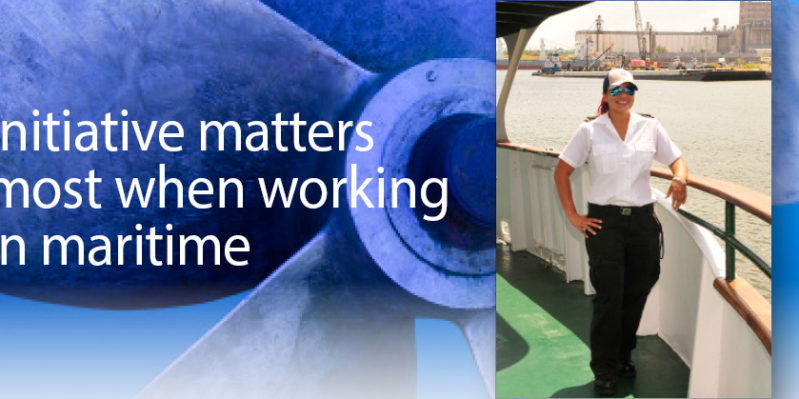
 More women have career opportunities in maritime as industry evolves
More women have career opportunities in maritime as industry evolves
Capt. Carol Curtiss and Capt. Amy Arrowood have traveled the world as mariners. They know what it’s like to be one of a few women on board a ship at any given time.
They are two of the 27 percent of women employed in the water transportation industry in the United States, and two of the 50,000 employed as captains and ship operators, according to the U.S. Bureau of Labor Statistics.
Like many, they chose a career at sea over an 8-to-5-office job, and have witnessed the industry change over the years to include more requirements for certifications. They have also watched the industry enter a workforce shortage as many leave for retirement.

Jennifer Williams is well on her way to a career in the maritime industry, having moved from New York to train at the San Jacinto College maritime program.
Photo credit: Jeannie Peng-Armao, San Jacinto College marketing, public relations, and government affairs department.
“Maritime has changed quite a bit since I started,” said Capt. Curtiss, instructor and professional speaker on “Myths, Facts & Fantasies About Working with Women in the Maritime Industry.” “The industry is more welcoming to women now, with women judged by their abilities today rather than gender.”
Both Capt. Curtiss and Capt. Arrowood are lending their expertise and knowledge to San Jacinto College as instructors in the maritime program. Capt. Curtiss is the first woman and one of only three people in the United States to have earned both captain and chief engineer, considered the highest licenses available aboard merchant cargo ships. She is certified to command any ship of any size as either a captain or a chief engineer. She’s a graduate of the U.S. Merchant Marine Academy, graduating in the third year that women were admitted.
“I went into this industry because of the world travel and sunsets on the ocean,” said Capt. Curtiss. “I can’t think of anything more enjoyable. I just couldn’t see myself behind a desk.”
Capt. Curtiss received the distinction of an acknowledgement in the U.S. Congressional Record in 2002. She is now retired, having spent over three decades sailing on various ships across the globe.
Capt. Arrowood graduated from Texas A&M University at Galveston, spent four years at sea and then completed three years of active duty in the USCG before embarking on her 20-year career in the maritime industry. She has received a USCG Commendation Medal, and USCG Meritorious Team and Unit Commendations. She is the 2006 recipient of the Jones F. Devlin Award from the Chamber of Shipping of America for Safe Operation and received Sabine Transportation Safety Officer of the Quarter.

Capt. Amy Arrowood is a San Jacinto College maritime instructor with more than 20 years of experience who is teaching future mariners for their U.S. Coast Guard certifications.
Photo credit: Jeannie Peng-Armao, San Jacinto College marketing, public relations, and government affairs department.
“I wasn’t the perfect mariner when I went onto my first vessel,” Arrowood said. “I made silly mistakes. I want to share my experiences and try to make newcomers’ experiences better than mine. I also want to provide support to prospective new mariners and those upgrading to the next level.”
Capt. Curtiss’ and Capt. Arrowood’s careers are admired by the likes of such students as Jennifer Williams. Williams is from New York and moved to Houston alone just to train at the San Jacinto College maritime program. She recently completed her first maritime internship aboard the M/V Sam Houston and will graduate in May 2016, receiving the first college degree in her family.
“I’m proud of this,” she said. “I love what I’m doing. Not many people know about what is available in the maritime industry. If I can do this, anyone, woman or a man, can do this. The possibilities are there.”
Capt. Arrowood added everyone has their place and their work to complete on a ship. The barriers that can exist are up to an individual. Initiative is key when working with a team of mariners to keep the ship running successfully.
“You might run into roadblocks, but you just need to work hard and know your job,” Capt. Arrowood said. “Any woman or man will do just fine in maritime. It’s all about knowing what you’ve learned and hard work. A little thick skin might help too.”
– Jeannie Peng-Armao
